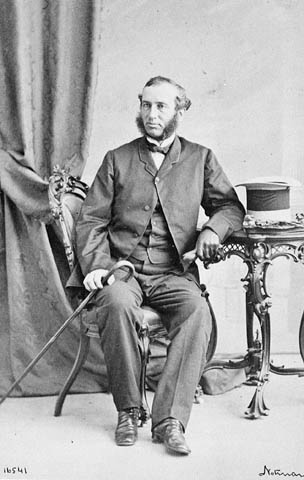Top Qs
Timeline
Chat
Perspective
Alexander Campbell (Canadian senator)
Canadian Father of Confederation (1822–1892) From Wikipedia, the free encyclopedia
Remove ads
Sir Alexander Campbell PC KCMG QC (March 9, 1822 – May 24, 1892) was an Upper Canadian statesman and a father of Canadian Confederation.[2][3]
This article includes a list of general references, but it lacks sufficient corresponding inline citations. (March 2013) |
Remove ads
Life
Summarize
Perspective
Born in Hedon, Yorkshire, he was brought to Canada by his father, James Campbell who was a doctor, when he was one year old. He was educated in French at St. Hyacinthe in Quebec and in the grammar school at Kingston, Ontario. Campbell studied law and was called to the bar in 1843. He became a partner in John A. Macdonald's law office.[4]
Campbell was a Freemason of St. John's Lodge, No. 3 (Ontario) of Kingston (now The Ancient St. John's No. 3). When the government was moved to Quebec in 1858, Campbell resigned.[5]
He was elected to the Legislative Council of the Province of Canada in 1858 and 1864, and served as the last Commissioner of Crown Lands 30 March 1864 – 30 June 1867. He attended the Charlottetown Conference and the Quebec City Conference in 1864, and at Confederation was appointed to the Senate of Canada. He later held a number of ministerial posts in the Cabinet of Prime Minister John A. Macdonald and was the sixth Lieutenant Governor of Ontario from 1887 to 1892.[6]
Historian Ged Martin discussed the reasons why Campbell never achieved first rank as a politician; he was lame and suffered from epileptic seizures, and his estranged wife was a certified lunatic (see Family section below).
In 1883, he built his home on Metcalfe Street, Ottawa, now known as "Campbell House".

He died in office in Toronto in 1892, and was buried at Cataraqui Cemetery in Kingston, Ontario.[7]
Campbell Crescent in Kingston, a street in the Portsmouth municipal district, is named in his honour.
Remove ads
Family
In 1855, Campbell married Georgina Frederica Locke, daughter of Thomas Sandwith of Beverley, Yorkshire, and a niece of Humphrey Sandwith III (1792–1874) of Bridlington.[7] As Ged Martin has detailed in an article on Campbell's private life, the marriage was a failure and his estranged wife spent time in asylums as a certified lunatic. He left two sons (the eldest was Charles Sandwith Campbell) and three daughters.[8]
Remove ads
References
External links
Wikiwand - on
Seamless Wikipedia browsing. On steroids.
Remove ads

